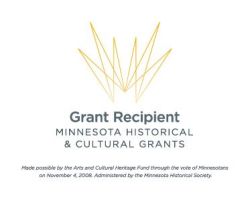Andrew Myrick insulted Dakota people the summer of 1862. What he said, and what he meant, have been matters of debate for a century.
Last summer, just in time to update A Trilling Narrative before it went into production, I discovered the earliest known rendition of this story. According to a source dated September 8, 1862, Myrick said hungry Dakota people could, “eat grass or their own dung.”
Does it matter? A callously hurled, “For all I care, they can eat grass” is insulting even without the smelly punch-line.
No matter what he said, Andrew Myrick is not the central character in this story; he simply got the most quotable line. A Dakota story of resistance to oppression has been masked by a century of rehashing the metaphorical meanings of Myrick’s insult. We’ve missed a major point: we might have taken Myrick literally.
First, the sources, then the story.
Little Crow to Henry Sibley 7 September 1862. Order Book, Volume 103 in the Henry H. Sibley Papers, the Minnesota Historical Society. Emphasis mine.
Yellow Medicine, September 7th, 1862
Dear Sir–
For what reason we have commenced this war I will tell you. It is on account of Major Galbraith. We made a treaty with the Government, and beg for what little we do get, and then cannot get it till our children are dying with hunger. It is with the Traders that commence. Mr. A.J. Myrick told the Indians that they would eat grass or there [sic] own dung. Then Mr. Forbes told the Lower Sioux that they were not men. Then Robert he was working with his friends how to defraud us of our money. If the young braves have push the white men, I have done this myself. So I want you to let Governor Ramsey know this. I have great many prisoners, women & children. It ain’t all our fault the Winnebagoes was in the engagement, two of them was killed. I want you to give me answer by the bearer. All at present.
Your truly friend,
his
Friend Little X Crow
Mark
With the holograph of this letter missing, this is the earliest report of the “grass” insult. Little Crow was there when Myrick uttered these words –although not at the Upper Agency and not on August 4 –and Little Crow repeated them in this letter copied into Sibley’s order book six weeks later.
But Andrew Myrick himself was the first one to tell us that “grass” was the subject of hot debate on the Lower Reservation in 1862. On July 26, 1862 he wrote to his brothers, complaining, “[Y]esterday about 98 mounted Indians and 25 or so on foot all armed soldiers of the soldiers lodge… formed a line of battle marched to all the stores and made the following pertinent and [ ] speech ‘You have said you have closed your stores for 2 Sundays and that we should have to eat grass. We warn you not to cut another stick of wood or to cut our grass’, feeling themselves probably much relieved departed.” [National Archives, RG 75, Special Files series.]
What was this soldiers’ lodge injunction about? Stephen Riggs offered ethnographic commentary when he said in June 1860 (emphasis mine): “It did not matter that we had …worked for them day in and day out almost the whole spring –we were white men and could afford to do it…. [I]t did not in the estimation of these lords of the soil free us from the obligation to pay for the wood we burned and the grass our cattle plucked. When the time of want came, as it did, often more than once a year, the old men with their pipes and the young men with their guns came to demand or take the tribute.” [Northwest Missions Manuscripts, MHS]
As I summarized in my historical essay introducing A Thrilling Narrative, “[S]tories like these show that Lower Dakota men were not the hapless victims of abuse at the hands of authorities that some secondary sources [on the Dakota War] imply. While clearly oppressed by the federal system, throughout the summer of 1862 some Dakotas continued to purposefully and vigorously resist the coercion to acculturate, including thwarting the machinations of the traders.” [p. 58]
These period sources suggest that Andrew Myrick wasn’t merely having a bad day when he told the Dakotas that they could eat the grass they forbade him cutting. Riggs was right when he termed Dakotas “lords of the soil” and “hay” and “grass” are the same word in Dakota. The grass growing on the reservation, and on this day 150 years ago, ripening into prime hay, was a Dakota resource. Whites could not use it without Dakota permission.
We know the summer of 1862 was a “time of want”(hunger), especially for Dakota traditionalists on the reservation. And we also know the traders had their backs to wall, threatened with the non-renewal of their trading licenses in 1863.
Am I excusing Andrew Myrick’s insult? No. I am suggesting there is a big difference between Myrick, whose spelling and grammar suggest had an average education, having an inexplicable Marie Antoinette moment, and Myrick, probably feeling a little smug, retorting (my paraphrase):
“Fine. You can have your grass. And eat it, too.”
Photo credit: Grasslands National Park, UBC Botanical Garden and Center for Research, via Google Images.



Pingback: A Fable Agreed Upon, part 3 | A Thrilling Narrative of Indian Captivity: Dispatches from the Dakota War of 1862
In 2010, in a lot I purchased at the Splink auction of the Risvold collection, was an uncatalogued barely legible pencilled note. Detective work revealed it was the hastily written last letter of Andrew Myrick, begging for help, August 21, 1862. If you’d like more information, contact MNHS where it now resides (patrick.coleman@mnhs.org). Caroline Schimmel, Greenwich, CT
Caroline,
Thank you for purchasing it! I will look is up this week!
oops, typo–that’s Spink. Give Patrick my best wishes.